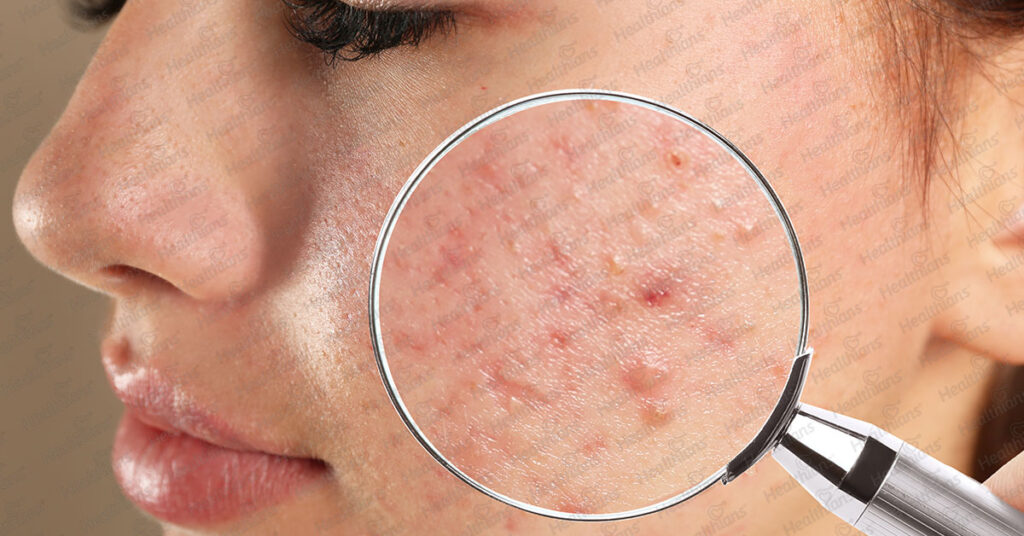You have to overcome obstacles when you have to achieve your dreams. And if your dream is to have clean and clear and radiant skin, you have to overcome a few obstacles too. These obstacles can be skin issues such as acne, eczema and rosacea.
Acne, eczema, and rosacea are among the most common skin issues that people face. While these conditions can be frustrating and even painful, the good news is that there are effective ways to prevent and treat them. In this blog, we’ll delve into the causes, symptoms, and strategies for managing these common skin problems.
Understanding acne
Acne is one of the most prevalent skin conditions, affecting people of all ages. It occurs when hair follicles become clogged with oil and dead skin cells. These clogged pores can result in the formation of pimples, blackheads, whiteheads, and in more severe cases, cysts.
Causes of acne:
Excess oil production:
One of the main causes of acne is the overproduction of sebum (oil) by the sebaceous glands.
Clogged pores:
When oil and dead skin cells accumulate in hair follicles, they create a breeding ground for bacteria.
Bacterial infection:
The presence of the bacterium Propionibacterium on the skin can lead to inflammation and the formation of acne lesions.
Hormonal changes:
Fluctuations in hormones, such as during puberty, menstruation, and pregnancy, can trigger acne.
Diet and lifestyle:
A high-glycemic diet and certain lifestyle factors, like stress, can exacerbate acne.
Preventing and treating acne:
Proper skin care:
Regularly cleanse your face with a gentle, non-comedogenic cleanser. Avoid harsh scrubbing, as it can irritate the skin.
Balanced diet:
Opt for a diet rich in fruits, vegetables, and whole grains. Avoid excessive consumption of sugary and greasy foods.
Hydration:
Drink plenty of water to keep your skin hydrated.
Over-the-counter products:
Over-the-counter treatments containing ingredients like benzoyl peroxide or salicylic acid can be effective for mild acne.
Prescription medications:
For more severe cases, consult a dermatologist who may prescribe antibiotics, topical retinoids, or oral contraceptives for hormonal acne.
Understanding eczema
Eczema, also known as atopic dermatitis, is a chronic skin condition that causes dry, itchy, and inflamed skin. It often appears in childhood but can persist into adulthood. Eczema is thought to result from a combination of genetic, environmental, and immune system factors.
Causes of eczema:
Genetics:
A family history of eczema or other allergic conditions can increase the risk of developing eczema.
Skin barrier dysfunction:
People with eczema have a compromised skin barrier, making it easier for irritants and allergens to penetrate the skin.
Immune system abnormalities:
An overactive immune response can lead to inflammation and itching.
Preventing and treating eczema:
Moisturise:
Keeping the skin well-hydrated is crucial. Use fragrance-free, hypoallergenic moisturisers regularly.
Avoid triggers:
Identify and avoid triggers that worsen your eczema, such as certain soaps, detergents, or allergens.
Gentle cleansing:
Use mild, non-soap cleansers and take short, lukewarm showers to prevent skin dryness.
Prescription medications:
Consult a dermatologist for prescription topical corticosteroids or non-steroidal anti-inflammatory creams when needed.
Oral medications:
In severe cases, oral medications, including immunosuppressants, may be prescribed.
Understanding Rosacea
Rosacea is a chronic skin condition that primarily affects the face, causing redness, visible blood vessels, and often, small, red bumps resembling acne. The exact cause of rosacea is unknown, but genetic and environmental factors are believed to play a role.
Causes of Rosacea:
Genetics:
A family history of rosacea can increase your susceptibility to the condition.
Dysfunction of blood vessels:
Abnormalities in blood vessels may contribute to the redness and flushing associated with rosacea.
Immune system response:
Inflammation and immune system reactions may also be involved in the development of rosacea.
Triggers:
Certain triggers, such as spicy foods, alcohol, hot beverages, and exposure to sunlight, can exacerbate rosacea symptoms.
Preventing and treating Rosacea:
Sun protection:
Use broad-spectrum sunscreen with at least SPF 30 and wear a wide-brimmed hat to shield your face from the sun.
Avoid triggers:
Identify and avoid triggers that worsen rosacea symptoms.
Gentle skincare:
Use gentle, fragrance-free skincare products to cleanse and moisturise the skin.
Topical medications:
Dermatologists may prescribe topical medications like azelaic acid or metronidazole to manage rosacea.
Oral medications:
In severe cases, oral antibiotics, such as doxycycline, may be prescribed to reduce inflammation and redness.
Laser therapy:
For visible blood vessels, laser therapy can be an effective treatment option.
Closing thoughts
While acne, eczema, and rosacea can be frustrating and, at times, difficult to manage, there are effective strategies for both prevention and treatment. Maintaining a healthy skincare routine, identifying and avoiding triggers, and seeking professional guidance when necessary are key steps in managing these common skin issues. Remember that each person’s skin is unique, and what works for one may not work for another, so patience and persistence are essential in the journey to healthy, radiant skin. Consult a dermatologist for personalised advice and treatment options tailored to your specific skin condition. With the right care and a little perseverance, you can regain confidence and comfort in your own skin.





